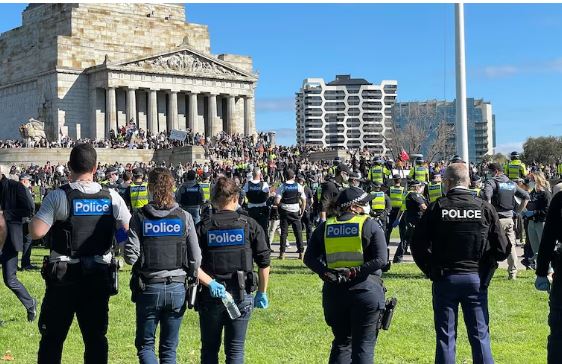The breaking down of law and order in Victoria has been evident for some time, but recently, this concept has accelerated to a very worrying level.
The past is only relevant to identify patterns; the future is the worry, as it seems nothing is being done to arrest the decline.
Currently, the situation where demonstrators, seemingly with impunity, do whatever they can to intimidate another sector of the community, instilling gross fear on any part of the community, is unacceptable on so many levels.
Worryingly, is that the intimidation is so vitriolic it is only a ‘hair’s breadth’ away from violence.
The seriousness of the situation cannot be downplayed, and yet the Police, who are responsible for maintaining law and order, seem ineffective through bias.
This is not the Australian way.
The bias by Policing has been developing for some time, and we suggest it has a lot to do with the failure of the principle of the ‘Separation of Powers’[i], a long-held presumption that has been eroded, and the management of public order is where it most obviously manifests.
The failure of this principle, where the decisions and responses to public order are tainted by Political bias, is a two-way street.
The blatant direct involvement of politics in decision-making has become far less obvious, but we are sure it still occurs; what has evolved is a far more insidious, unconscious bias. A will to please political masters or those who support the government without direct interaction.
The Police have no role in allowing partisan views to influence responses but must respond on the basis of maintaining law and order, and that includes protecting vulnerable groups and all citizens; the issues and reasons for disquiet must never influence the operational response.
Some of the disquiet in police ranks that has provoked industrial action recently has been attributed to the Forces’ obvious bias.
This move toward partisanship with the government of the day has been an attempt by Governments to own police powers and have a far greater say in the operations of Policing, a repugnant concept that might seem fine in theory, but, as we have seen, makes Policing ineffective.
The current demonstrations against Israel by pro-Palestinian groups supporting Hamas are a case in point.
The basis of the demonstrations is those allegedly opposed to Israel’s response to the attacks, hostage-taking and murders committed by Hamas. The role of Victoria Police must not be influenced by the reasons for the demonstration but by providing a Police response to maintain Law and order and should be as concerned with protecting the abused Jews as they should be for those who identify as Pro-Palestinian.
The accusation of police bias is a ‘hot button’ issue sure to raise the ire of Police executives. Be that as it may, the matter is immensely serious, and the issue of the breakdown of the ‘Separation of Powers’ and biase must be corrected.
To ignore the issue will be a blight on the capacity of Police Senior management as this issue lies at their feet.
The following list of incidents indicates beyond doubt that bias is at play and must be addressed.
- Black Lives Matter – passive police response acting as spectators.
- COVID-19 – aggressive police response including use of firearms on demonstrators – aggressive role extending over numerous occasions for two years, including chasing and dispersing demonstrators using defensive weapons like pepper spray as an attack weapon. Tea bagging protestors to make them breach the COVID rules.
- Sundry environmental demonstrations – passive police role acting as spectators.
- Pro-Palestine (Hamas) demonstrations -passive police response acting as spectators.
We do not support unnecessarily aggressive responses but demand the Police apply the law without fear or favour, malice or ill will, absolutely, irrespective of the issue at hand.
Following this principle will rapidly improve and rebuild the image and confidence that the community had in its Police, and the police members will be able to return to the non-partisan positions they once were able to hold in their professional capacity, improving the morale within the organisation so that the workplace again becomes non-partisan.
We acknowledge, however, that the government has a lot to answer for by diluting the Police power to manage these issues by repealing the ‘move on’ Laws.
It has seriously diminished police authority to perform their task.
By removing those powers, the closest analogy is a law to remove the ability of doctors to carry a stethoscope when working in Emergency Rooms (ER).
The Victoria Police can and must do better operationally, free from Government pressure and interference.
[i] In Australia, the power to make and manage laws is shared between the Parliament, the Executive and the Judiciary. The separation of powers avoids any person or group having all the power. https://peo.gov.au/


Until Covid I was trusting police and supporting it without exception.
Now, my view of Australian police changed completely- I do not trust them and I see them as bullies with psychopathic tendencies. It is shame they are so low now. I observed that behaviour of police previously in communist countries but never in Western democracies. At the moment I have serious doubts about existence of democratic principles, especially human rights in Australia, UK or US. On paper everything looks still nice but reality and practice is completely different. Pity.
Great article, I’m not optimistic that much will change in vicpol without a thorough inquiry, then an almost total cleanout of those of the rank of inspector and above. It will be brutal but leaving anyone in charge who actively or passively engages in or supports this selective policing will only continue the problem. The same remedy needs to be appiled to much of the public service and qangoes in Vic.
Not going to happen the Libs are a slivers difference from Labor and though won’t say it they support most of Labors policies and methods.
I remember having an argument with Ex command over the wearing of rainbow tabards at demonstrations. I argued that this undermined the independence and neutrality of the office of constable, this of course fell on deaf ears.
I agree with Paul C
I just add that it is never lawful to use rubber bullets on citizens who have dispersed, use capsicum spray on stationery non-aggressive citizens nor tackle and batter non- aggressive dispersing citizens.
Unlawful behavior needs to be prosecuted and those leaders who have condoned this behavior, including by looking the other way, need to be retired.
” Not the Australian way” or “not Australian values”.
Growing up in the country the police came to the school once a year. The rowdy kids were unusually quiet that day. Often we knew the police as they were often involved in the local sporting clubs. But familiarity didn’t breed contempt as they also were known to hand out tuff love to the local lads that were selfishly irresponsible in their actions. But society has changed, as should policing also.
But have Australian values changed, or has a minority seen our western society values as a weakness to be exploitated? I have never meet a police officer that joined for the money. Many reasons of to serve, respect for the principals of policing, following the respect of previous family members that served,ect. I don’t know one that could be paid enough to stay if they thought they had become political enforces.
The pandemic interaction evoke emotions of anger with me, yet at the same time sadness and sympathy for the police involved. Imagine the psychological of having to justify your actions by saying you are just doing your job. A job that has changed duemail to politicalisation, as any separation of powers appear at odds with Vicpols commands actions.
During the lock down I was pulled up for speeding. Yes even “over the hill” blokes speed down hill. As the policeman walked towards the towards our car, being out of the 5 k’s, (medic appointment ), the thought crossed my mind that perhaps I should video the exchange for self protection. Deciding against it turned out to be the right decision as the officer was professional and respectful in his approach.
Noticing the wide eyes of my young grandchildren in the back seat, it occurs to me that their introduction to modern policing was different to my childhood. They had been witnessing the media’s coverage, without prior interaction with police. I asked the officer to have a chat with the girls. He did a sterling job. As he left he gave the same advice as had been given to me 60 years ago, “anytime you need help, talk to the policend.”
As much as I dislike the box ticking of inquiries, if it is somehow possible in Victoria under the present governance style, as the basic principles and values of community policing haven’t changed, should the modern changes to policing be evaluated for outcomes by a independent community body?
The decline in policing standards is another example of a labour government that has failed and is failing Victorians every day on some many levels
It’s a tough job and the deals that this government does with the greens continues to make the job harder. Reference move on laws , public drunkenness, lowering age of criminality etc etc
Tell me about it. How do you think I feel. 37 years of loyal service and look what they did to me. Oh sorry, I had an opinion.
As was recently reported, one in four members considers leaving the job. I wonder why. Politicisation of our police force is no doubt one of the reasons. You join to serve and protect without fear or favour. All this has eroded. Gone are the days when members were proud of their uniform. To get out of the divi van and not wearing the cap was considered an offence! But police were not only proud of the uniform, but, most important, of the service they provided to the community. These days they are hampered by politically motivated regulations! Political correctness governs the execution of duty.
And…look at them now! Wearing those filthy yellow vests, and losing their posture because of all that heavy equipment they have to carry. I wonder how you can chase an offender in all that gear. And I hasten to add-no hats even on foot patrol.
The young graduates are no doubt full of enthusiasm. The other day I visited Croydon Police Station. There I was served by two young members, one of them of Chinese background. Both female officers acted in friendly, professional manner. When I asked them how they liked the job, they responded that they loved it. I pray that they will love it still in a couple of years.
No public confidence, from tyrannical/politically led, NWO stooges.